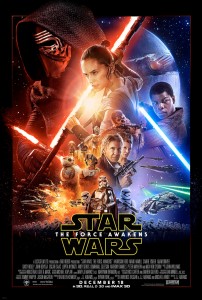The Trolls Awaken Latest Star Wars Trailer Reveals Discrimination within Geek Culture

In just a little over a month, eager fans of the Star Wars saga will see the next installment of the franchise, The Force Awakens, on the big screen. Despite the letdown of the prequel trilogy (1999-2005), with its wooden dialogue and poor character development, many fans seem hopeful that J. J. Abrams as producer will bring new life and vision to the upcoming sequels. As a longtime Star Wars fan, I doubt that anything will ever top the wonder and heartwarming beauty of the original trilogy, but I’m excited to see the return of Luke, Leia, and Han Solo and follow the developments of new characters as they fight the forces of evil to maintain peace in the galaxy.
Though I don’t have exact statistics, I would venture to guess that many humanists are also science-fiction geeks. Famous writers, directors, and other figures in the sci-fi field such as Isaac Asimov, Gene Roddenberry, and Susan Sackett have all identified as humanists. There seems to be something appealing to humanists about using faraway planets, aspirational technology, and extra-terrestrial lifeforms to explore the human experience. Perhaps these heights of fiction permit us to better understand our own natures as we watch beloved characters grapple with moral dilemmas and ethical decisions that are much like our own, despite the alien landscapes in which they take place. At the same time, by stretching the limits of our imagination to include travel at the speed of light, swords made from plasma, and instant healing devices, science fiction is also fun.
Unfortunately, though science fiction can transcend our everyday lives with its fascinating technology and intriguing settings, it cannot always surpass our current prejudices. One such example is the latest Twitter hashtag relating to The Force Awakens, #BoycottStarWarsVII, which claims that because the film’s trailer features a black character it is “anti-white.” One Twitter user went so far as to call the film “a propaganda piece that alienates it’s [sic] core audience of white males.” (As though there aren’t enough movies featuring white males as the protagonists!) Though Wired suggests that the hashtag is part of a trolling campaign that shouldn’t be taken so seriously, the issue of representation in film is a serious one, and the vitriol directed at the latest Star Wars simply for having a black protagonist seems disturbingly real.
When people in marginalized communities, be they people of color, women, or LGBTQ individuals, fail to see heroes on the big screen who look like them, they can internalize the harmful message that their stories are not worth telling and their lives are worth less. Many science fiction storytellers, such as novelist Octavia Butler and Star Trek creator Gene Roddenberry, used the medium to question the social constructs of race and gender and break down the barriers that we so often create to separate people into categories. In his book Return of the Heroes, Hal G. P. Colebatch points out that while we (rightly) criticize the original Star Wars trilogy as being very focused on white, male characters, giving Leia Jedi powers was exceptionally open-minded for its time. Yet the wider culture surrounding science fiction, much like the culture of the humanist community, still remains largely dominated by white men. A couple years ago, the Internet seemed to be full of a meme called “Idiot Nerd Girl,” that dismissed women in science fiction, fantasy, and gaming groups as only superficially interested in these topics. Despite numerous pieces calling out the sexism of dismissing women as “not real geeks” or “fake nerds,” women in both online and offline spaces where geeks congregate can face microaggressions, such as dismissive comments or “ironic” racist or sexist jokes, and sometimes even outright hostility. All too often people of color are erased completely from geek spaces, which is why, as the blog Nerds of Color explains, having a black character (Finn, played by John Boyega) feature prominently in the latest Star Wars movie is such a huge step toward their recognition in the science fiction community.
Despite calls for greater inclusivity within geek culture, including science fiction enthusiasts, there seems to be something inherently elitist about geek communities. Perhaps it’s the fact that credibility within the subculture is based on intimate knowledge of even the most minute details of the subject matter, and having the leisure time and money to spend on the books, movies, video games, and merchandise that go along with engrossing oneself in an imaginary world requires a certain amount of privilege. Women, people of color, and working-class individuals, to name a few, are less likely to have access to that leisure time and money, so they face more barriers to participation in geek communities. For those who can overcome economic barriers, the social barriers of microaggression and discrimination can be another hurdle that keeps them from feeling like full-fledged members of the community.
However, if there’s one thing that the geek community should know, it’s the experience of being marginalized. Many of us grew up feeling ostracized because of our passion for science fiction, fantasy, comic books, manga, or videogames. I know many self-proclaimed geeks who feel almost confused that the term has now become a point of pride. Similarly, many humanists have also experienced marginalization when they are honest about their lack of belief in a god. I would hope that science fiction geeks, especially those who might also be humanists, would be able to use these experiences to extend empathy for people of color and women in their communities who continue to feel marginalized in both geek and humanist spaces. Just because every storm trooper wears the same all-white body armor doesn’t mean they can’t be human underneath.
